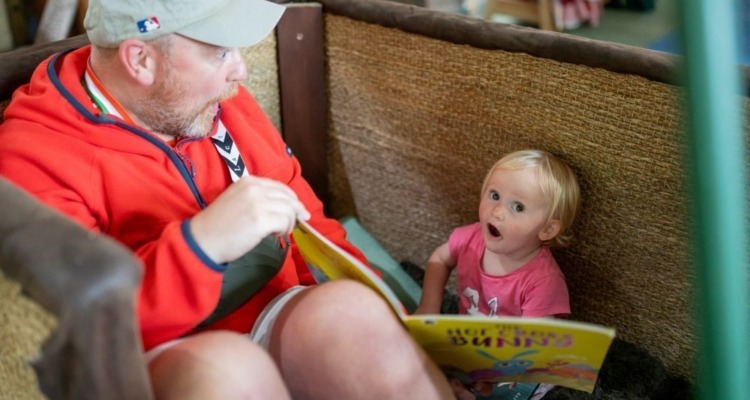Inside Time: Shared reading in HMP Gartree
The latest in our series of articles showcasing The Reader Organisation's work in Criminal Justice settings as featured in Inside Time is from the Psychologically Informed Planned Environment (PIPE) unit in HMP Gartree in Leicestershire.
Nicola Bennison, Reader-in-Residence at HMP Gartree, discusses The Spirit is too Blunt an Instrument by Anne Stevenson with the Bookchat group.
The Spirit is too Blunt an Instrument
The spirit is too blunt an instrument
to have made this baby.
Nothing so unskilful as human passions
could have managed the intricate
exacting particulars: the tiny
blind bones with their manipulating tendons,
the knee and the knucklebones, the resilient
fine meshings of ganglia and vertebrae
in the chain of the difficult spine.Observe the distinct eyelashes and sharp crescent
fingernails, the shell-like complexity
of the ear with its firm involutions
concentric in miniature to the minute
ossicles. Imagine the
infinitesimal capillaries, the flawless connections
of the lungs, the invisible neural filaments
through which the completed body
already answers to the brain.Then name any passion or sentiment
possessed of the simplest accuracy.
No. No desire or affection could have done
with practice what habit
has done perfectly, indifferently,
through the body’s ignorant precision.
It is left to the vagaries of the mind to invent
love and despair and anxiety
and their pain.- Anne Stevenson, Poems 1955-2005 (Bloodaxe Books, 2005) www.bloodaxebooks.com
We are a group of eleven today. I read the poem through, slowly.
“Gawd. I’ve no idea what that’s all about. There’s a lot of long words,” says K. “It makes no sense to me.”
I agree about the words. We can talk about them. I read it again.
Does it make you think of anything, even if you don’t understand it?
K: “Is it, like, we’re looking at some ill person, there’s something wrong with him, like he’s disabled or something?”
What does anyone else think?
P: “Yeah that’s what I thought too.”
What makes you think that?
Everyone scrutinises the text.
P points: “Here, I think it’s this, about difficult spine, sounds like it’s not right.”
Yes! And why would a spine be difficult ?
“It’s perhaps because it’s like, really complicated.”
“And fragile.”
Yes, I say, it makes you think of the way you have to hold a baby’s head up until it gets strong.
“No,” says G, “I think it’s about the perfection of the human body, how whatever we do, it makes no difference, it generally comes out perfect. It’s DNA!”
Go on…
“See here, where it saysNo desire or affection could have done / with practice what habit / has done perfectly. It’s, like, automatic – nothing to do with what we do!”
We mull over this.
H: “To me, it’s like being given a guided tour of a high performance car, you can see how beautifully it’s made, what it can do…”
Yes! And there are machine-like elements – the manipulating tendons, the chain…
We unscramble some of the big words together – capillaries and ganglia, infinitesimal. We savour the sound of some of the words – knucklebones, ossicles…
And what about the spirit?
We discuss it for a while and decide that it could be either divine or human. G is sticking to his guns:
“Nah, it’s evolution, isn’t it! The miracle of evolution!”
But there is something ambiguous here about what sort of control we have – the body is already doing what the brain tells it to yet…
I read some of the lines again. Why would bones be blind? I wonder.
H: “When babies are born not all their bones are connected yet…”
G: “You know what I think, when the baby’s still in the womb, the bones aren’t all joined up but it’s like they join up as if by instinct, they find their way. Maybe that’s it, like they are swimming blindly.”
It’s a lovely image!
Someone reads out the lines about the lungs. K is still paying attention:
“That’s the miracle, I think –when a baby first comes out of the womb and it automatically breathes, fills its lungs [he mimes this] – because air, you can’t see it or taste it, it’s just… a miracle!”
We return to the text.
Those last lines still worry me, I say, and read them again.
“Yeah, there’s only one positive thing in there, isn’t there, love…”
But it’s time to go. The men are standing up, folding up their copies of the poem to read later, and ponder for themselves those last lines.
Our Criminal Justice team operate around the UK, bringing weekly shared reading groups to those in secure environments. Find out more about shared reading in prisons, PIPEs and Criminal Justice settings on our website: https://www.thereader.org.uk/what-we-do-and-why/criminal-justice
Share
Related Articles

We cannot just tell parents to read more. To truly improve children’s futures through reading, we need to properly support the adults around them to do so.
Responding to the Department of Education's announcement that 2026 will be a Year of Reading, The Reader's Managing Director Jemma…

Storybarn Book of the Month: Saving the Butterfly
This month, as part of Refugee Week (16-22 June), we've been taking a look back at one of our favourites…

Shared Reading in Wirral Libraries: ‘As a kid people read stories to you but as an adult you lose that – and it’s a fantastic thing to do!’
Two Strategic Librarians for Wirral Libraries, Kathleen McKean and Diane Mitchell have been working in partnership with the UK’s largest…


